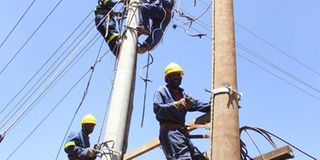Kenya Power nets Sh37 billion from electricity sale

Kenya Power workers install concrete poles to replace wooden ones in Eldoret Town, Uasin Gishu County, on January 29, 2015. PHOTO | JARED NYATAYA | NATION MEDIA GROUP
What you need to know:
- The company spent Sh10.5 billion in expansion and upgrade of the electricity network.
- Less than half of Kenya Power’s customers are currently on prepaid meters.
Kenya Power's after-tax profits grew by 38.5 per cent in the six-month period to December 2014.
The utility attributed the jump in net earnings to increased electricity sales and an upward review of tariff during the trading period.
Revenue from electricity sales increased to Sh37.6 billion, from Sh26.9 billion recorded in 2013.
During the period, the company spent Sh10.5 billion to expand and upgrade its electricity network.
An increased uptake of loans from both bilateral and commercial lenders saw the utility’s finance costs rise to Sh2.3 billion from Sh1.9 billion incurred during the previous period.
“To secure revenue, we are planning to introduce smart metering systems to endure billing accuracy for large power customers as well as reduce overhead costs. The company will enhance construction of alternative power lines for uninterrupted supply to improve quality and reliability of electricity,” Kenya Power Managing Director Ben Chumo said in a statement.
SMART METERS
Last year, Kenya Power said it would introduce smart meters for its customers by January 2015 in selected estates in Nairobi and for small businesses in the central business district whose monthly power bills exceed Sh100,000.
The company announced a budget of Sh150 million for the first phase of the project that would see 5,000 customers connected to the devices in a duration of two years, paving the way for distribution of the meters to 500,000 other clients at a cost of Sh15 billion.
On Monday, Kenya Power suffered a blow to its plans to outsource meter-reading services after the Employment and Labour Relations Court suspended the tendering process following an application by the Kenya Electrical Trades and Allied Workers Union (Ketawu) challenging the bid.
In its application, Ketawu argued that more than 1,000 employees of Kenya Power currently working as meter readers, supervisors and data-filing clerks could lose their jobs should the company’s plan succeed.
Less than half of Kenya Power’s customers are currently on prepaid meters. In 2012, it set a target to migrate all its clients to prepaid meters by the end of this year to avoid losing revenue through defaults.




